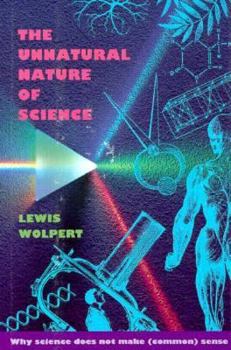The Unnatural Nature of Science: ,
Select Format
Select Condition 
Book Overview
Quoting scientists from Aristotle to Einstein, British researcher Lewis Wolpert describes science as a special mode of thought. Once we understand science as unnatural, we can begin to negotiate its murkiest, most misunderstood terrain. Wolpert is the author of The Triumph of the Embryo and coauthor of A Passion for Science.
Format:Hardcover
Language:English
ISBN:0674929802
ISBN13:9780674929807
Release Date:January 1993
Publisher:Harvard University Press
Length:191 Pages
Weight:1.00 lbs.
Dimensions:0.8" x 5.8" x 8.6"
Customer Reviews
3 ratings
Important concepts about science
Published by Thriftbooks.com User , 14 years ago
To me this is a very valuable book because what he discusses is at the roots of the trouble people have in understanding science. The review by Luc Reynaert highlighted important aspects of the book. The flaws pointed by other reviewers are, to me, secondary to the contribution of setting science apart from common sense. The other book about the subject that I like immensely is Uncommon sense by Alan Cromer. He further explores the subject and links it to the effectiveness of teaching science.
What is science, how it developed, and how it differs from technology
Published by Thriftbooks.com User , 15 years ago
This is a down-to-earth, clear introduction to the scientific way of thinking. I agree with evolutionist R. Dawkins's advice that the book should be read regardless of your personal views about science and scientists. I believe Wolpert's book is an excellent introduction to science because it clarifies how technology and science are different and yet feed on each other;and enable the advance of our knowledge of the real world. What impressed me the most is the author's separation of "common-sense beliefs" from scientific thinking. And how serendipity arises from hard work, educated guesses and "inspiration";the willingness to take a leap into the darkness and advance predictions that can be tested in the laboratory or by other observations and measurements (e.g., in cosmology).
Common sense.
Published by Thriftbooks.com User , 22 years ago
Excellent essay about the real nature of science and the fact that day-to-day common sense will never give an understanding of the nature of science.Absolutely to the point are his analyses of science and technology (science produces ideas whereas technology results in the production of usable objects), science and philosophy (science has been immune to philosophical doubts) & science and morality (decisions are political and economic).His viewpoint on genetic engineering is 'common sense': "... genetic engineering ... has so far damaged no one. By contrast, smoking, AIDS, drugs and alcohol have caused massive damage to children in utero." (p.168)Particularly impressive are the chapters on 'Science and religion' (7) where the author defends secularism, and on 'Moral and Immoral Science' (8).This book contains some very painful paragraphs on Konrad Lorenz.A must read for everybody interested in western and scientific culture.





